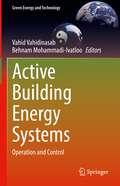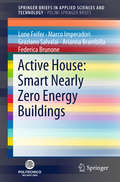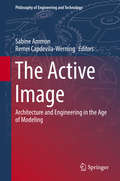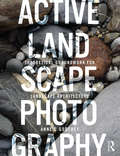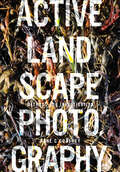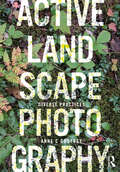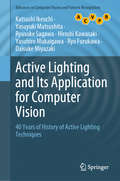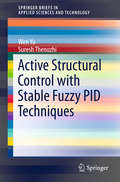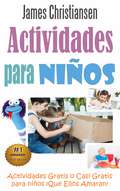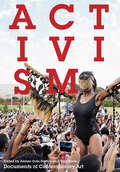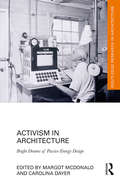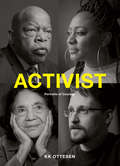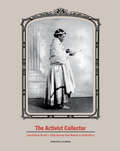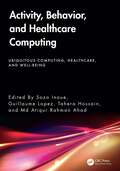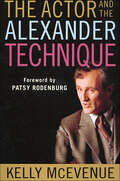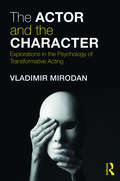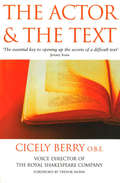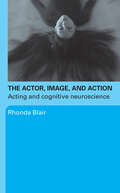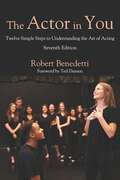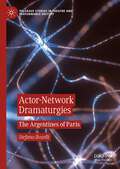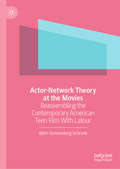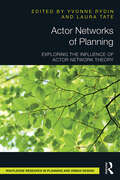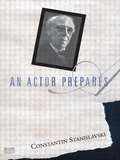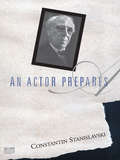- Table View
- List View
Active Building Energy Systems: Operation and Control (Green Energy and Technology)
by Vahid Vahidinasab Behnam Mohammadi-IvatlooThis book provides a comprehensive study on state-of-the-art developments in the control, operation, and market participation of active buildings (ABs). Active buildings can support the broader energy system by intelligent integration of renewable-based energy technologies for heating, cooling, electricity, and transport. This important reference analyzes the key features of modern control and operation techniques applied to these systems. Contributions from an international team of experts present practical methods with evidence and case studies from applications to real-world or simulated active buildings. Sample computer codes and analytical examples aid in the understanding of the presented methods. The book will support researchers working on the control and operation of buildings as an energy system, smart cities and smart grids, and microgrids, as well as researchers and developers from the building and energy engineering, economic, and operation research fields.Provides an in-depth review of building-level energy systems technologies;Covers codes, standards, and requirements for active building control systems;Includes sample computer code and analytical examples.
Active House: Smart Nearly Zero Energy Buildings (SpringerBriefs in Applied Sciences and Technology)
by Lone Feifer Marco Imperadori Graziano Salvalai Arianna Brambilla Federica BrunoneThe book provides an overview of the Active House (AH) vision, intended as a building design method “beyond” the passive approach for buildings of the future that will be more and more connected, smart and innovative. It offers a novel philosophical design approach in which buildings, new or renovated, are in balance with natural, renewable energies and become “concentrators-distributors” of energies instead of being consumers of resources. The book is composed of five chapters, providing information on fundamental aspects of innovations toward resource-efficient buildings, as well as case studies presenting the concept in practice. It demonstrates that a completely new design approach is possible, and that a turning point has been reached. Lastly, it shows how the AH Alliance, along with designers, institutions, industries and academies, is bringing a breath of fresh air to the world of construction.
The Active Image
by Sabine Ammon Remei Capdevila-WerningThe "active image" refers to the operative nature of images, thus capturing the vast array of "actions" that images perform. This volume features essays that present a new approach to image theory. It explores the many ways images become active in architecture and engineering design processes and how, in the age of computer-based modeling, images play an indispensable role. The contributors examine different types of images, be they pictures, sketches, renderings, maps, plans, and photographs; be they analog or digital, planar or three-dimensional, ephemeral, realistic or imaginary. Their essays investigate how images serve as means of representing, as tools for thinking and reasoning, as ways of imagining the inexistent, as means of communicating and conveying information and how images may also perform functions and have an agency in their own. The essays discuss the role of images from the perspective of philosophy, theory and history of architecture, history of science, media theory, cognitive sciences, design studies, and visual studies, offering a multidisciplinary approach to imagery and showing the various methodologies and interpretations in current research. In addition, they offer valuable insight to better understand how images operate and function in the arts and sciences in general.
Active Landscape Photography: Theoretical Groundwork for Landscape Architecture
by Anne C GodfreyPhotographs play a hugely influential but largely unexamined role in the practice of landscape architecture and design. Through a diverse set of essays and case studies, this seminal text unpacks the complex relationship between landscape architecture and photography. It explores the influence of photographic seeing on the design process by presenting theoretical concepts from photography and cultural theory through the lens of landscape architecture practice to create a rigorous, open discussion. Beautifully illustrated in full color throughout, with over 200 images, subjects covered include the diversity of everyday photographic practices for design decision making, the perception of landscape architecture through photography, transcending the objective and subjective with photography, and deploying multiplicity in photographic representation as a means to better represent the complexity of the discipline. Rather than solving problems and providing tidy solutions to the ubiquitous relationship between photography and landscape architecture, this book aims to invigorate a wider dialogue about photography's influence on how landscapes are understood, valued and designed. Active photographic practices are presented throughout for professionals, academics, students and researchers.
Active Landscape Photography: Methods for Investigation (Active Landscape Photography)
by Anne C GodfreyHow can photography be transformed into an active process of investigation for landscape architecture and environmental design? The second book in Godfrey’s series, Active Landscape Photography, presents engaged photographic methods that turn photography into a rigorous, thoughtful endeavor for the research, planning and design of landscape places. Photography is the most ubiquitous and important form of representation in these disciplines. Yet photography is not specifically taught as a core skill within these fields. This book creates a starting point for filling this gap. Concepts and working methods from contemporary photography and critical cultural theories are contextualized into situations encountered in the daily practice of landscape architecture and environmental design. These methods can be integrated into practices in academic and professional settings or picked up and self-taught by an individual reader. Part I: Methods presents easily accessible approaches to photography creating a core set of active skills. Part II: Practices discusses working methods of specific contemporary photographers and extrapolates their practices into common extrapolates their practices into common planning and design situations. Contemporary photographers presented include Richard Misrach, Dawoud Bey, Duane Michals, Latoya Ruby Frazier, Mark Klett, Sophie Calle, Joe Deal, Robert Adams, Naima Green, Bernd and Hilla Becher, Stephen Shore, David Hockney, Amy Sherald, William Christenberry, Jeff Wall, and Sohei Nishino. Beautifully illustrated in full color with over 150 images by Godfrey, her students, and contemporary photographers, this book provides both clear guidelines for a set of diverse methods as well as a deeper discussion about the implications of making and using photography in environmental design for professionals, academics, students and researchers.
Active Landscape Photography: Diverse Practices (Active Landscape Photography)
by Anne C GodfreyDiverse Practices, the third book in the Active Landscape Photography series, presents a set of unique photographic examples for site-specific investigations of landscape places. Contributed by authors across academia, practice and photography, each chapter serves as a rigorous discussion about photographic methods for the landscape and their underlying concepts. Chapters also serve as unique case studies about specific projects, places and landscape issues. Project sites include the Miller Garden, Olana, XX Miller Prize and the Philando Castile Peace Garden. Landscape places discussed include the archeological landscapes of North Peru, watery littoral zones, the remote White Pass in Alaska, Sau Paulo and New York City’s Chinatown. Photographic image-making approaches include the use of lidar, repeat photography, collage, mapping, remote image capture, portraiture, image mining of internet sources, visual impact assessment, cameraless photography, transect walking and interviewing. These diverse practices demonstrate how photography, when utilized through a set of specific critical methods, becomes a rich process for investigating the landscape. Exploring this concept in relationship to specific contemporary sties and landscape issues reveals the intricacy and subtlety that exists when photography is used actively. Practitioners, academics, students and researchers will be inspired by the underlying concepts of these examples and come away with a better understanding about how to create their own rigorous photographic practices.
Active Lighting and Its Application for Computer Vision: 40 Years of History of Active Lighting Techniques (Advances in Computer Vision and Pattern Recognition)
by Katsushi Ikeuchi Yasuyuki Matsushita Ryusuke Sagawa Hiroshi Kawasaki Yasuhiro Mukaigawa Ryo Furukawa Daisuke MiyazakiThis book describes active illumination techniques in computer vision. We can classify computer vision techniques into two classes: passive and active techniques. Passive techniques observe the scene statically and analyse it as is. Active techniques give the scene some actions and try to facilitate the analysis. In particular, active illumination techniques project specific light, for which the characteristics are known beforehand, to a target scene to enable stable and accurate analysis of the scene. Traditional passive techniques have a fundamental limitation. The external world surrounding us is three-dimensional; the image projected on a retina or an imaging device is two-dimensional. That is, reduction of one dimension has occurred. Active illumination techniques compensate for the dimensional reduction by actively controlling the illumination. The demand for reliable vision sensors is rapidly increasing in many application areas, such as robotics and medical image analysis. This book explains this new endeavour to explore the augmentation of reduced dimensions in computer vision. This book consists of three parts: basic concepts, techniques, and applications. The first part explains the basic concepts for understanding active illumination techniques. In particular, the basic concepts of optics are explained so that researchers and engineers outside the field can understand the later chapters. The second part explains currently available active illumination techniques, covering many techniques developed by the authors. The final part shows how such active illumination techniques can be applied to various domains, describing the issue to be overcome by active illumination techniques and the advantages of using these techniques. This book is primarily aimed at 4th year undergraduate and 1st year graduate students, and will also help engineers from fields beyond computer vision to use active illumination techniques. Additionally, the book is suitable as course material for technical seminars.
Active Structural Control with Stable Fuzzy PID Techniques (SpringerBriefs in Applied Sciences and Technology)
by Wen Yu Suresh ThenozhiThis book presents a detailed discussion of intelligenttechniques to measure the displacement of buildings when they are subjected tovibration. It shows how these techniques are used to control active devicesthat can reduce vibration 60-80% more effectively than widely used passiveanti-seismic systems. After introducing various structural control devices andbuilding-modeling and active structural control methods, the authors proposeoffset cancellation and high-pass filtering techniques to solve some commonproblems of building-displacement measurement using accelerometers. The mostpopular control algorithms in industrial settings, PD/PID controllers, are thenanalyzed and then combined with fuzzy compensation. The stability of thiscombination is proven with standard weight-training algorithms. These conditionsprovide explicit methods for selecting PD/PID controllers. Finally, fuzzy-logicand sliding-mode control are applied to the control of wind-induced vibration. The methods described are supported by reports of experimental studies on atwo-story building prototype. This book is avaluable resource for academic researchers interested in the effects of controland mechatronic devices within buildings, or those studying the principles ofvibration reduction. Practicing engineers working on the design andconstruction of any sort of high-rise or vulnerable building and concerned withthe effects of either wind or seismic disturbances benefit from the efficacy ofthe methods proposed.
Actividades para Niños: Actividades Gratis o Casi Gratis para niños ¡Que Ellos Amaran!
by James Christiansen Salvador Sandoval Sanchez¿Sus hijos este verano se quejan de que "no hay nada que hacer" o "estoy aburrido" ? ¿Necesitas algunas ideas nuevas para mantenerlos entretenidos hasta que la escuela regrese a la sesión? No busque más - esta guía de actividades gratuitas y baratas para niños le ayudará a patear el blues de aburrimiento! Mis hijos son probablemente como el suyo: les encanta estar fuera de la escuela, pero pronto los sonidos de "estoy aburrido" y "no hay nada que hacer" eco a través de nuestra casa y tanto mi esposa y yo anhelamos algo para mantenerlos entretenidos y evitar que comiencen a quejarse. Con esta motivación, he recolectado grandes actividades gratuitas o casi gratuitas para los niños que mis hijos adoran y el suyo también! En este libro aprenderá: 1. Cómo mantener a los preescolares entretenidos y cómo hacerlo economicamente! 2. Divertirse y casi gratis actividades interiores y al aire libre para niños de 6 a 8 años. 3. Cómo divertirse con niños mayores e independientes con un presupuesto 4. Actividades de interior y al aire libre para niños de todas las edades 5. Actividades divertidas con estilo, incluyendo actividades de aprendizaje de niños para niños de todas las edades ¿Necesitas otra razón para comprar este libro? Aquí hay una gran: dono el 5% de los ingresos de las ventas de mis libros a la lectura es fundamental, el más grande y más respetado fonfo de alfabetización para niños sin fines de lucro en América! Detenga las quejas y cure el aburrimiento de hoy. ¡Consiga este libro y consiga algunas grandes ideas para las actividades de los niños !hoy!
Activism (Whitechapel: Documents of Contemporary Art)
by Afonso Dias Ramos Tom SnowAn edited collection that addresses the vital intersection of contemporary art and activism in this watershed cultural moment.Activism is a critical point of contention for institutions and genealogies of contemporary art around the world. Yet artists have consistently engaged in activist discourse, lending their skills to social movements, and regularly participating in civil and social rights campaigns while also boycotting cultural institutions and exerting significant pressure on them. This timely volume, edited by Tom Snow and Afonso Ramos, addresses an extraordinary moment in debates over the institutional frameworks and networks of art including large-scale direct actions, as well as a radical rethinking of art venues and urban spaces according to racial, class, or gender-based disparities, including demonstrations against the extractive and exploitative practices of neoliberal accumulation and climate catastrophe.From ACT UP and its affiliate groups since the dawn of the AIDS crisis to the counter-spectacle and street theatrics of the so-called Arab Spring and Occupy, to ongoing protest movements such as Black Lives Matter, Rhodes Must Fall, and Decolonize This Place, activist aesthetics has proven increasingly difficult to define under traditional classifications. Resurgent campaigns for decolonial reckoning, ecological justice, gender equality, indigenous rights and antiracist pedagogies indicate that the role of activism in contemporary art practice urges a critical reassessment. One pressing question is whether contemporary art&’s most radical politics now takes place outside, against, or in spite of, conventional sites of display such as museums, biennials, and galleries.Artists surveyed include: ACT UP, Basel Abbas & Ruanne Abou-Rahme, Allora & Calzadilla, Tania Bruguera, Black Audio Film Collective, Chto Delat, Andrea Fraser, Nan Goldin, Sanja Iveković, Gulf Labor, Amar Kanwar, Leslie Labowitz, Liberate Tate, Sethembile Msezane, Zanele Muholi, Jan Nikolai Nelles & Nora Al-Badri, Decolonize This Place, Michael Rakowitz, Oliver Ressler. Writers include: Dave Beech, Judith Butler, Amílcar Cabral, Elias Canetti, Douglas Crimp, Jodi Dean, Gilles Deleuze, T.J. Demos, Nina Dubrovsky, Süreyyya Evren, Catherine Flood, Matthew Fuller, David Graeber, Gavin Grindon Félix Guattari, Brian Holmes, Carrie Lambert-Beatty, Lucy Lippard, Yates McKee, MTL Collective, Gregory Sholette, Françoise Vergès, Peter Weiss, Eyal Weizman.
Activism in Architecture: Bright Dreams of Passive Energy Design (Routledge Research in Architecture)
by Margot McDonald Carolina DayerThis edited collection gathers contributions from a diverse range of renowned scholars and professionals to uncover the unique relationship between passive architectural systems and activism. Focusing on the pioneering work of the influential American chemist and inventor, Harold R. Hay (1909–2009), and the environmental awareness events that took hold in the United States during the 1960s and 1970s, the book assembles essays which closely examine Hay's contribution to architecture and the work of those who directly and tangentially were affected by it. The book also offers insights into the role of passive energy design today. Appealing to researchers, architects and students interested in architecture and design technology, Activism in Architecture explores the role of passive environmental inventions as an active agent in shaping socio-political debates.
Activist: Portraits of Courage
by KK OttesenA speech on the radio. A high school literature class. A promise made to a mother.Activism begins in small ways and in unexpected places. In this inspiring book, over forty activists from Billie Jean King to Senator Bernie Sanders and Grover Norquist to Al Sharpton recount the experiences that sparked their journeys and share the beliefs that keep them going. These are citizens who met challenge with action. Their visions for peace, equality, and justice have reshaped American society—from voting to reproductive rights, and from the environment to the economy.• Brings together multiple generations from different (sometimes opposite perspectives)• Features KK Ottesen's luminous photographs revealing passion, purpose and optimism• Powerful narratives that collective remind us that anyone can take the future into their own handsFans of 1960Now, Martha Rosler: Irrespective, and Charles White: A Retrospective will love this book. This book is perfect for:• Activists, old and new• Politically engaged readers • Photography fans• Millennials
The Activist Collector: Lida Clanton Broner’s 1938 Journey from Newark to South Africa
by Christa Clarke“After twenty-eight years of desire and determination, I have visited Africa, the land of my forefathers.” So wrote Lida Clanton Broner (1895–1982), an African American housekeeper and hairstylist from Newark, New Jersey, upon her return from an extraordinary nine-month journey to South Africa in 1938. This epic trip was motivated not only by Broner’s sense of ancestral heritage, but also a grassroots resolve to connect the socio-political concerns of African Americans with those of black South Africans under the segregationist policies of the time. During her travels, this woman of modest means circulated among South Africa’s Black intellectual elite, including many leaders of South Africa’s freedom struggle. Her lectures at Black schools on “race consciousness and race pride” had a decidedly political bent, even as she was presented as an “American beauty specialist.” How did Broner—a working class mother—come to be a globally connected activist? What were her experiences as an African American woman in segregated South Africa and how did she further her work after her return? Broner’s remarkable story is the subject of this book, which draws upon a deep visual and documentary record now held in the collection of the Newark Museum of Art. This extraordinary archive includes more than one hundred and fifty objects, ranging from beadwork and pottery to mission school crafts, acquired by Broner in South Africa, along with her diary, correspondence, scrapbooks, and hundreds of photographs with handwritten notations. Published by the Newark Museum. Distributed worldwide by Rutgers University Press.
Activités pour enfants : Activités gratuites ou presque que vos enfants vont adorer !
by James ChristiansenVos enfants se plaignent qu'il n'y a rien à faire ou qu'ils s'ennuient ? Vous avez besoin de nouvelles idées pour les divertir jusqu'à la rentrée scolaire ou le temps d'un après-midi ? Ne cherchez plus. Ce guide proposant des activités gratuites ou peu coûteuse vous aidera à combattre l'ennui ! Mes enfants sont probablement comme les vôtres : ils adorent être en vacances scolaires, mais très rapidement les « je m'ennuie » et « il n'y a rien à faire » se font entendre dans la maison et ma femme et moi aspirons à trouver une idée pour les divertir et pour éviter les plaintes. C'est cette motivation qui m'a poussé à recueillir des idées d'activités gratuites ou presque que mes enfants ont adorées et que les vôtres adoreront aussi ! Grâce à ce livre, vous apprendrez à : 1. Divertir des enfants en âge d'aller à l'école maternelle sans que cela ne vous coûte cher ! 2. Divertir des enfants de 6 à 8 ans grâce à des activités en plein air et en intérieur presque gratuites. 3. Vous amuser avec des enfants plus âgés et indépendants, avec peu de moyens. 4. Proposer des activités à des enfants de tout âge, que ce soit en intérieur ou en extérieur. 5. Proposer des activités amusantes pertinentes et éducatives pour des enfants de tout âge. Vous avez besoin d'une autre raison pour acheter ce livre ? En voici une : je fais don de 5 % du prix de vente de mes livres à l'association Reading Is Fundamental, la principale organisation à but non lucratif pour l'alphabétisation des enfants, qui est aussi la plus respectée aux Etats-Unis ! Finies les plaintes ! Fini l'ennui ! Maintenant. Procurez-vous ce livre dès aujourd'hui et obtenez de superbes idées d'activités pour enfants !
Activity, Behavior, and Healthcare Computing (Ubiquitous Computing, Healthcare and Well-being)
by Sozo Inoue Guillaume Lopez Tahera Hossain Rahman Ahad, Md AtiqurActivity, Behavior, and Healthcare Computing relates to the fields of vision and sensor-based human action or activity and behavior analysis and recognition. As well as a series of methodologies, the book includes original methods, exploration of new applications, excellent survey papers, presentations on relevant datasets, challenging applications, ideas and future scopes with guidelines. Featuring contributions from top experts and top research groups globally related to this domain, the book covers action recognition, action understanding, gait analysis, gesture recognition, behavior analysis, emotion and affective computing, healthcare, dementia, nursing, Parkinson’s disease, and related areas. It addresses various challenges and aspects of human activity recognition – both in sensor-based and vision-based domains. This is a unique edited book covering both domains in the field of activity and behavior.
The Actor and the Alexander Technique
by Kelly McEvenueF.M. Alexander developed the Alexander Technique of movement in the early 20th century. Combining vocal clarity and body movement, Alexander developed a performance coaching method that is used by dancers, actors, singers, etc. In The Actor and the Alexander Technique, Kelly McEvenue writes the first basic book about how this unique technique can help actors feel more natural on the stage. She provides warm-up exercises, "balance" and "center" exercises, spatial awareness exercises. She talks about imitation, the use of masks, nudity on the stage, dealing with injury and aging. She talks about specific productions that have successfully used the Alexander Technique, such as "The Lion King". With a foreword by Patsy Rodenburg of our own phenomenal The Actor Speaks this is a book that belongs on the shelf of every working and studying actor.
The Actor and the Character: Explorations in the Psychology of Transformative Acting
by Vladimir MirodanTransformative acting remains the aspiration of many an emerging actor, and constitutes the achievement of some of the most acclaimed performances of our age: Daniel Day-Lewis as Lincoln, Meryl Streep as Mrs Thatcher, Anthony Hopkins as Hannibal Lecter – the list is extensive, and we all have our favourites. But what are the physical and psychological processes which enable actors to create characters so different from themselves? To understand this unique phenomenon, Vladimir Mirodan provides both a historical overview of the evolution of notions of 'character' in Western theatre and a stunning contemporary analysis of the theoretical implications of transformative acting. The Actor and the Character: Surveys the main debates surrounding the concept of dramatic character and – contrary to recent trends – explains why transformative actors conceive their characters as ‘independent’ of their own personalities. Describes some important techniques used by actors to construct their characters by physical means: work on objects, neutral and character masks, Laban movement analysis, Viewpoints, etc. Examines the psychology behind transformative acting from the perspectives of both psychoanalysis and scientific psychology and, based on recent developments in psychology, asks whether transformation is not just acting folklore but may actually entail temporary changes to the brain structures of the actors. The Actor and the Character speaks not only to academics and students studying actor training and acting theory, but contributes to current lively academic debates around character. This is a compelling and original exploration of the limits of acting theory and practice, psychology, and creative work, in which Mirodan boldly re-examines some of the fundamental assumptions of actor training and some basic tenets of theatre practice to ask: What happens when one of us ‘becomes somebody else’?
The Actor And The Text
by Cicely BerryCicely Berry, Voice Director of the Royal Shakespeare Company, is world-famous for her voice teaching. The Actor and the Text is her classic book, distilled from years of working with actors of the highest calibre.
The Actor, Image, and Action: Acting and Cognitive Neuroscience
by Rhonda BlairThe Actor, Image and Action is a 'new generation' approach to the craft of acting; the first full-length study of actor training using the insights of cognitive neuroscience. In a brilliant reassessment of both the practice and theory of acting, Rhonda Blair examines the physiological relationship between bodily action and emotional experience. In doing so she provides the latest step in Stanislavsky's attempts to help the actor 'reach the unconscious by conscious means'. Recent developments in scientific thinking about the connections between biology and cognition require new ways of understanding many elements of human activity, including: imagination emotion memory physicality reason. The Actor, Image and Action looks at how these are in fact inseparable in the brain's structure and function, and their crucial importance to an actor’s engagement with a role. The book vastly improves our understanding of the actor's process and is a must for any actor or student of acting.
The Actor in You: Twelve Simple Steps to Understanding the Art of Acting
by Robert BenedettiSince the first edition of The Actor in You was published a quarter-century ago, thousands of students have benefited from Robert Benedetti's decades of experience educating some of the United States' finest actors. In this Seventh Edition, Benedetti expresses the fundamental elements of acting in simple language, leading readers through understanding their own bodies and voices, acting technique, and the basics of rehearsals and staging shows. Each step includes exercises to aid students in self-discovery and self-development as they grow from novices into practiced actors. Titles by Robert Benedetti also available from Waveland Press: Action!: Professional Acting for Film and Television, Second Edition (ISBN 9781478649397) and The Actor at Work, Eleventh Edition (ISBN 9781478649045).
Actor-Network Dramaturgies: The Argentines of Paris (Palgrave Studies in Theatre and Performance History)
by Stefano BoselliThis book provides key critical tools to significantly broaden the readers’ perception of theatre and performance history: in line with posthuman thought, each chapter engages Actor-Network Theory and similar theories to reveal a comprehensive range of human and non-human agents whose collaborations impact theatre productions but are often overlooked. The volume also greatly expands the information available in English on the networks created by several Argentine artists. Through a transnational, transatlantic perspective, case studies refer to the lives, theatre companies, staged productions, and visual artworks of a number of artists who left Buenos Aires during the 1960s due to a mix of personal and political reasons. By establishing themselves in the French capital, queer playwright Copi and directors Jorge Lavelli, Alfredo Arias, and Jérôme Savary, among others, became part of the larger group of intellectuals known as “the Argentines of Paris” and dominated the Parisian theatre scene between the 1980s and 90s. Focusing on these Argentine artists and their nomadic peripeteias, the study thus offers a detailed description of the complexity of agencies and assemblages inextricably involved in theatre productions, including larger historical events, everyday objects, sexual orientation, microbes, and even those agents at work well before a production is conceived.
Actor-Network Theory at the Movies: Reassembling the Contemporary American Teen Film With Latour
by Björn Sonnenberg-SchrankThis book is one of the first to apply the theoretical tools proposed by French philosopher Bruno Latour to film studies. Through the example of the Hollywood Teen Film and with a particular focus on Actor-Network Theory (ANT), the book delineates how Teen Film has established itself as one of Hollywood’s most consistent and dynamic genres. While many productions may recycle formulaic patterns, there is also a proliferation of cinematic coming-of-age narratives that are aesthetically and politically progressive, experimental, and complex. The case studies develop a Latourian film semiotics as a flexible analytical approach which raises new questions, not only about the history, types and tropes of teen films, but also about their aesthetics, mediality, and composition. Through an exploration of a wide and diverse range of examples from the past decade, including films by female and African-American directors, urban and rural perspectives, and non-heteronormative sexualities, Actor-Network Theory at the Movies demonstrates how the classic Teen Film canon has been regurgitated, expanded, and renewed.
Actor Networks of Planning: Exploring the Influence of Actor Network Theory
by Yvonne Rydin Laura TatePlanning is centrally focused on places which are significant to people, including both the built and natural environments. In making changes to these places, planning outcomes inevitably benefit some and disadvantage others. It is perhaps surprising that Actor Network Theory (ANT) has only recently been considered as an appropriate lens through which to understand planning practice. This book brings together an international range of contributors to explore such potential of ANT in more detail. While it can be thought of as a subset of complexity theory, given its appreciation for non-linear processes and responses, ANT has its roots in the sociology of scientific and technology studies. ANT now comprises a rich set of concepts that can be applied in research, theoretical and empirical. It is a relational approach that posits a radical symmetry between social and material actors (or actants). It suggests the importance of dynamic processes by which networks of relationships become formed, shift and have effect. And while not inherently normative, ANT has the potential to strengthen other more normative domains of planning theory through its unique analytical lens. However, this requires theoretical and empirical work and the papers in this volume undertake such work. This is the first volume to provide a full consideration of how ANT can contribute to planning studies, and suggests a research agenda for conceptual development and empirical application of the theory.
An Actor Prepares
by Constantin StanislavskiThe first volume of Stanislavski's enduring trilogy on the art of acting defines the "System", a means of mastering the craft of acting and of stimulating the actor's individual creativeness and imagination.
An Actor Prepares (Bloomsbury Revelations Ser.)
by Constantin StanislavskiStanislavski's simple exercises fire the imagination, and help readers not only discover their own conception of reality but how to reproduce it as well.
